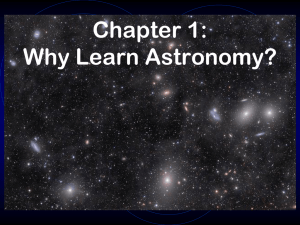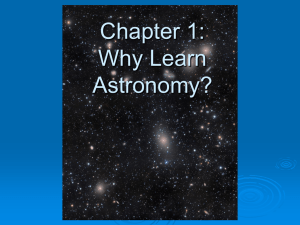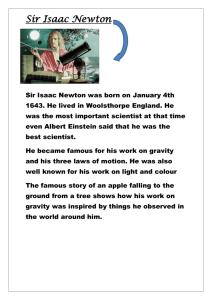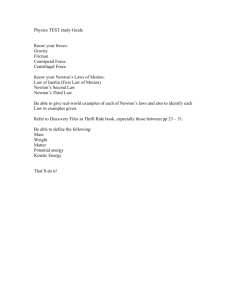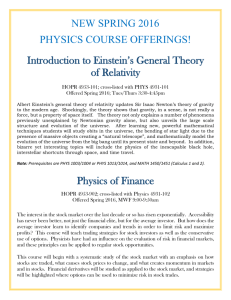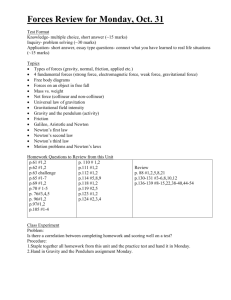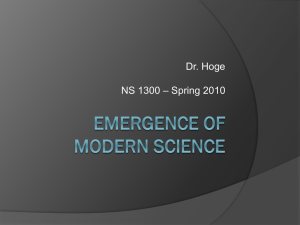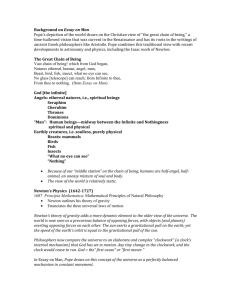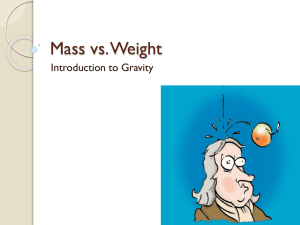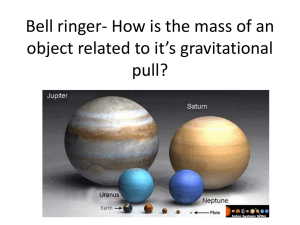Astronomy 1143: Review Guide For Final The final exam will be
advertisement
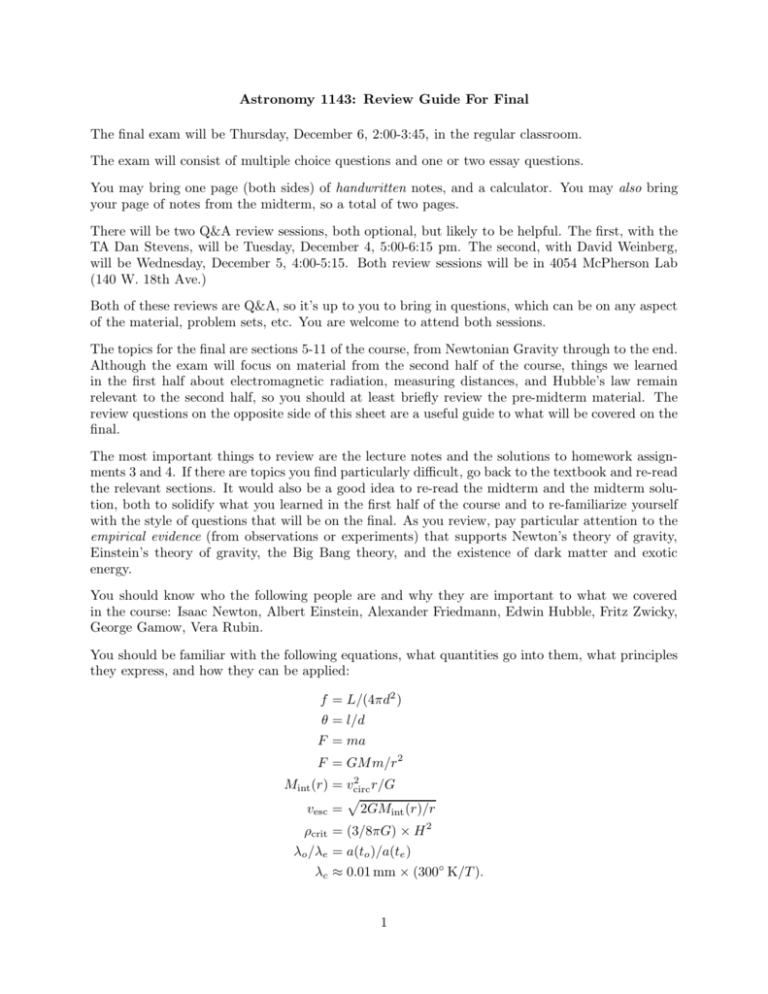
Astronomy 1143: Review Guide For Final The final exam will be Thursday, December 6, 2:00-3:45, in the regular classroom. The exam will consist of multiple choice questions and one or two essay questions. You may bring one page (both sides) of handwritten notes, and a calculator. You may also bring your page of notes from the midterm, so a total of two pages. There will be two Q&A review sessions, both optional, but likely to be helpful. The first, with the TA Dan Stevens, will be Tuesday, December 4, 5:00-6:15 pm. The second, with David Weinberg, will be Wednesday, December 5, 4:00-5:15. Both review sessions will be in 4054 McPherson Lab (140 W. 18th Ave.) Both of these reviews are Q&A, so it’s up to you to bring in questions, which can be on any aspect of the material, problem sets, etc. You are welcome to attend both sessions. The topics for the final are sections 5-11 of the course, from Newtonian Gravity through to the end. Although the exam will focus on material from the second half of the course, things we learned in the first half about electromagnetic radiation, measuring distances, and Hubble’s law remain relevant to the second half, so you should at least briefly review the pre-midterm material. The review questions on the opposite side of this sheet are a useful guide to what will be covered on the final. The most important things to review are the lecture notes and the solutions to homework assignments 3 and 4. If there are topics you find particularly difficult, go back to the textbook and re-read the relevant sections. It would also be a good idea to re-read the midterm and the midterm solution, both to solidify what you learned in the first half of the course and to re-familiarize yourself with the style of questions that will be on the final. As you review, pay particular attention to the empirical evidence (from observations or experiments) that supports Newton’s theory of gravity, Einstein’s theory of gravity, the Big Bang theory, and the existence of dark matter and exotic energy. You should know who the following people are and why they are important to what we covered in the course: Isaac Newton, Albert Einstein, Alexander Friedmann, Edwin Hubble, Fritz Zwicky, George Gamow, Vera Rubin. You should be familiar with the following equations, what quantities go into them, what principles they express, and how they can be applied: f = L/(4πd2 ) θ = l/d F = ma F = GM m/r 2 2 Mint (r) = vcirc r/G p vesc = 2GMint (r)/r ρcrit = (3/8πG) × H 2 λo /λe = a(to )/a(te ) λc ≈ 0.01 mm × (300◦ K/T ). 1 Review Questions I won’t give sample multiple choice questions this time, but here are some general questions to guide your reviewing. I don’t promise that they cover everything that will be on the exam, but if you have a firm grasp on the answers to all of these, then you should do well. • What are the key ideas of Newton’s theory of gravity? What are its two key equations and what do they mean? According to Newton’s theory why is the gravitational acceleration of an object independent of its mass? • What is the empirical evidence showing that Newton’s theory is an accurate description of nature? • How does Einstein’s theory of gravity (GR) differ from Newton’s? • What is the empirical evidence showing that Einstein’s theory of gravity is a more accurate description of nature than Newton’s theory? • How do we expect gravity to affect the expansion of the universe? What is the difference between the gravitational effect of “attractive” matter and “exotic” energy? • What is the critical density? How is it related to the geometry of space and to the fate of the universe? • What is the relation between the expansion of the universe and the redshift of photons? • What particles make up atoms and atomic nuclei? What is heat? What is absolute zero? What is the relation between the temperature of a body and the energy/wavelength of the photons that it emits? • What is the big bang theory? • Where does most of the hydrogen, helium, and deuterium in the universe come from? When did the nuclei of these atoms form? Where do heavier elements (carbon, oxygen, etc.) come from? • What is the cosmic microwave background? • What are the key pieces of empirical evidence for the big bang theory? • What is the empirical evidence for extended halos of dark matter around galaxies? • How much dark matter do we think is present in the universe? Why do we think that dark matter is probably a new fundamental particle rather than something made of protons and neutrons? • How do we use observations of supernovae to measure the expansion history of the universe? • How do we use structure in maps of the CMB to measure the geometry of space? • What is the empirical evidence for exotic energy? Why do we think that the density of exotic energy is about 75% of the critical density? • How do galaxies and clusters of galaxies form? What is the relation between structure we see in the universe today and the tiny, 0.001% fluctuations that we measure in the CMB? • Have you completed your Student Evaluation? Remember to bring it to the final. 2 Astronomy 1143: Student Evaluation Your feedback on this free form evaluation will be valuable in shaping how I teach Astronomy 1143 next time, especially as this semester was my first time through this course. Thinking over the content of the course and evaluating its strong and weak points is also valuable for you as part of reviewing for the final exam. I therefore request that you set aside 20 minutes during your review for the final to complete this evaluation. Please bring it with you to the final, where I will have an envelope for collecting them. Your evaluation should be anonymous, and you may write it or type it as you prefer. I will not read any evaluations until after I have completed grading the course. You should also have received an email requesting your SEI evaluation of this course. Please fill out the numerical ratings poriton of the SEI online. The SEI ratings are valuable to me, and my department, and the university, as a way of tracking whether things are basically going well with the course and my own teaching of it. It can only serve this function if the response rate is close to 100%, so that it provides a full sampling of student opinion. For this evaluation, please tell me anything you wish about what aspects of the course you liked and what aspects could be improved. You may want to look back at the syllabus to review the GEC and course objectives. I list some questions below to prompt your thinking. Please write or type your evaluation on a separate sheet, or on the bottom/back of this sheet. 1. What material did you find most valuable? What did we spend too much time on? What do you wish we had spent more time on? 2. What aspects of the lectures were most valuable? What aspects could be improved? Would a different balance between blackboard and Power Point be more effective? 3. Were the homework assignments useful for learning the course material and teaching you new things? What would make them better? 4. Did you find the textbook useful? Was the intersection between the book, the lectures, and the assignments adequate? Were the supplementary materials (course notes, other handouts, web page) valuable/sufficient? If you enjoyed this course, please (a) encourage other students to take it, and (b) consider taking other astronomy courses, such as Black Holes (A1142), Life in the Universe (A1143), or the honors sections of Astronomy 1161 or 1162. I am happy to offer advice on courses and instructors.
